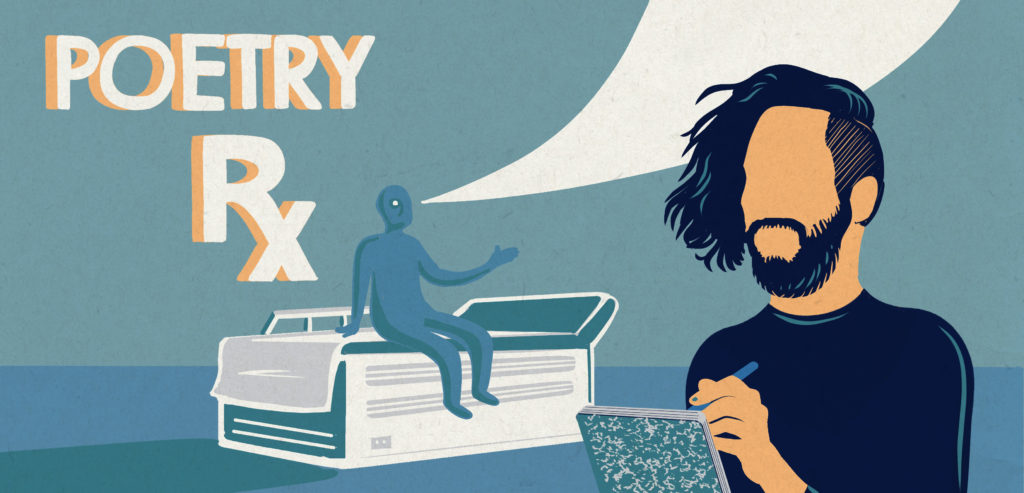In our column Poetry Rx, readers write in with a specific emotion, and our resident poets—Sarah Kay, Kaveh Akbar, and Claire Schwartz—take turns prescribing the perfect poems to match. This week, Kaveh Akbar is on the line.
Dear Poets,
I was in an abusive relationship for several years, and two years ago today the man I’d been involved with died by suicide. We had not been in touch for a long while before his death, but I’m still not through dealing with all the damage from our relationship and completely unequipped to know how to grieve him. Is there a poem that might help me make more sense of an overwhelming amount of conflicting emotions?
Sincerely,
Still Not Over It
Dear Still Not Over It,
I thought a long time about which poem to prescribe you, and kept coming up against the reality that no poem would precisely correspond to your exact experience (unless you wrote it!), nor would any poem help you “make more sense” of a situation that is aggressively hostile to sense—a man claimed to love you but he hurt you, you freed yourself but he died and now you need to learn how to grieve him despite his abuse. It’s profoundly irrational, which is to say, it’s profoundly human and true.
I give you Kevin Prufer’s “Black Woods.” The poem ends:
Listen to yourself. Did he step inside you?
Listen to yourself. Is he trapped inside you?
Let go of me. Is it black woods in there?
It seems to me a poem deeply invested in exploring our inherently illogical response to grief. The chilling, unforgettable closing repetition of “Listen to yourself” is, of course, what the griever can never do, not really, so overpowering is the noise of grief itself. The open, bracketed spaces remind me of Anne Carson’s translations of Sappho—here are moments too thundering for history to keep them, the silences not silences at all, but rather typographical concessions to the failure of a medium.
This sounds like an excruciating situation, and I hope so much you have people in your life with whom you can speak about it. Prufer’s poem offers a glimpse of the irrational heart of grief warring with the omnipresent pressure to conceal it, to move beyond it and once more conform to convention. I hope you find the freedom to argue, grapple, and grow with the grief you’re experiencing.
—KA
If you are having thoughts of suicide, call the National Suicide Prevention Lifeline at 1-800-273-8255 (TALK) or go to SpeakingOfSuicide.com/resources for a list of additional resources.
*
Dear Poets,
I am in love with a man who will never love me back. This is not a story of unrequited love or him loving someone else. We’ve been together ten months, but he has never loved anyone before and is convinced that he will never be able to match my feelings for him. Despite our differences in emotional attachment, he treats me better than any other man I have dated. My question is whether it is worth it to be in a relationship with someone who doesn’t return your feelings. Do I really need love if I have respect?
Sincerely,
Unloved and okay.
Dear Unloved and Okay,
Yes, you absolutely do. And, I’m not entirely convinced you even have respect—someone who respected you wouldn’t knowingly keep you in a relationship where the balance of affection is so out of whack, where the power dynamics are so skewed in his favor.
For you, I offer Faiz Ahmed Faiz’s “Be Near Me.” It’s a desperate poem where even the anklets clink with pain, where the “wine being poured makes the sound / of inconsolable children.” Everything is colored with the speaker’s psychic pain, every good thing is made worse. Still, the speaker calls out for their “tormentor,” their “love.”
Every day you spend in a relationship with someone who does not cherish you is a day defined by lack, a day dulled by the absence of passion. You deserve more.
—KA
If you are having thoughts of suicide, call the National Suicide Prevention Lifeline at 1-800-273-8255 (TALK) or go to SpeakingOfSuicide.com/resources for a list of additional resources.
*
Dear Poets,
I have a medical condition that causes frequent involuntary movements, so I find myself constantly seeking stillness. Even when I escape from the sounds and constant movement of the world, I can never escape from the part of my brain whose dysfunction seems to thrive on interrupting my peace. I am constantly trying to come to terms with the understanding that this condition is a part of my life and that treatment is limited and so I must deal with it, but I’m not always sure how. Do you have a poem for someone who loves peace and quiet and yet is their own biggest obstacle in achieving it?
Sincerely,
Interrupting Myself
Dear Interrupting Myself,
So much of poetry is stillness, so much of our manipulation of language is really a way to give texture to the stillness beneath it. Increasingly I have been thinking about my own poetry as a way to throw a language blanket over the invisible-but-everywhere-present silences around me in order to see their contours, their motion.
Today, I give you Jane Yeh’s “A Short History of Silence.” Yeh builds a world where even the clocks, even the reflections in the mirror stay still. The denizens of the world “sit like bread in a stay-fresh wrapper.” The most dynamic movement of the poem happens when the “we” rocks “back and forth” in “long / Black dresses.” Besides that, it’s just watching candles melt, horse-hair grow.
For all its stillness, its silence, there is something decidedly unsettled about this poem. The rocking in the dresses seems self-soothing, like a distraught child rocking themselves in a corner. The mosquitoes crave the people’s delicious blood, and beautiful speeches hurt (no wonder everyone is keeping silent!). The stillness here seems to signal an unspoken menace—what’s more still than wood? And what is it conspiring toward, in that final line?
It’s important to see that stillness can be intensely fraught, just as motion can be soothing. I’m sorry you have to bear the condition you describe, and won’t pretend to know what it’s like. But if stillness isn’t an option for you today, then my hope is that you will be able to find peace in movement, in a body that, like a lovable but clingy cat, constantly seeks to remind you of its presence.
—KA
Want more? Read earlier installments of Poetry Rx. Need a poem? Write to us! Next week, Sarah Kay will be answering questions.
Kaveh Akbar’s poems have appeared recently in The New Yorker, Poetry, the New York Times, the Nation, and elsewhere. His first book is Calling a Wolf a Wolf. Born in Tehran, Iran, he teaches at Purdue University and in the low-residency M.F.A. programs at Randolph College and Warren Wilson.
from The Paris Review https://ift.tt/2LjZMzy


Comments
Post a Comment